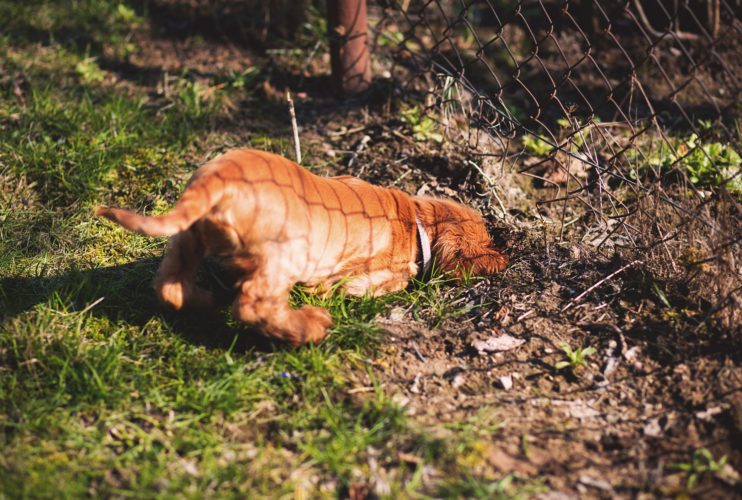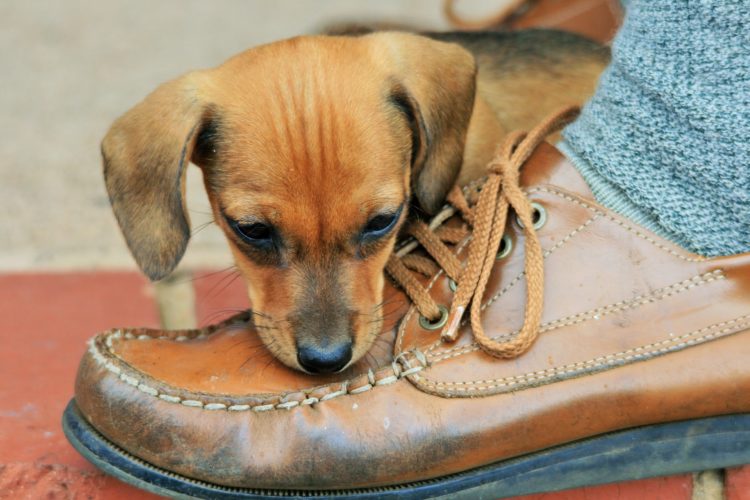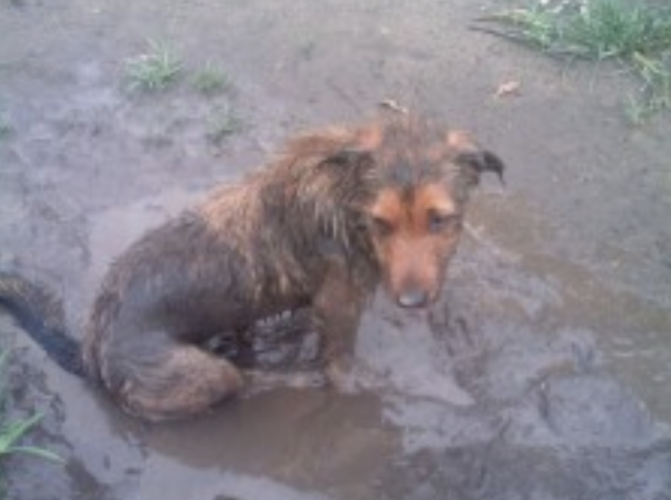Destructive and Messy Dog Behaviours
Understanding Destructive Dog Behaviour: Summary
- Destructive and messy dog behaviour may be unwanted by humans but many are natural canine behaviours.
- Management of the destructive dog behaviour involves supervising your dog’s activities or locating them where they cannot create mess or destruction.
- Long term solutions involve satisfying the dog’s needs and providing appropriate activities for your dog.
Understanding destructive and messy dog behaviours
Digging! Chewing! Rolling in mud or poo!!
Does your dog create havoc around your home or garden? Do they love destructive and messy dog behaviours? But you don’t? Pet Problems Solved helps you understand this behaviour and reduce the mess!
The first thing to do is to stop thinking of behaviours such as digging or chewing as destructive. Yes, they cause destruction but that’s on human terms. Dogs are just performing natural behaviours. They may also be doing these behaviours due to boredom or anxiety.
Here’s more explanation about why dogs may be destructive or messy…
Digging
Digging is a natural canine behaviour. Dogs dig to find a cool spot in summer or a warm spot in winter. They dig to find grubs or roots to eat.
Dogs dig to have fun or to help you with the gardening. They dig because they are bored. They dig because they are alone and anxious.
Chewing
Chewing is a normal behaviour in dogs. All puppies chew and dogs explore their world using their mouths.
Dogs may also chew when they have mouth, gum or digestive problems. Have a teeth check with your vet. Your dog may also be chewing due to boredom or separation anxiety.
Rolling in mud or poo
Some dogs just love to roll in mud or animal poo. This may be, in the case of mud, to keep cool or to remove itchy parasites.
Rolling in poo may be an evolutionary behaviour to disguise their canine smell and cover themselves in the scent of their potential prey. ‘Poo perfume’!
As these destructive behaviours are natural in the dog world, these instinctive canine behaviours will be difficult to stop entirely. Instead you may have more success in satisfying your dog’s need to perform them and provide suitable places and situations to allow them.

Management of the destructive or messy dog
Preventing destructive behaviours
Managing destructive behaviours will not cure the unwanted behaviour but it will control it enough to prevent it happening.
Some management strategies include:
- Shutting doors and/or building barriers to precious areas
- Keeping your dog on a lead when you need to control their behaviour
- Providing more outlets for your dog’s energy eg. canine sports, training, toys, games, walks
- Using other services eg. dog walker, doggy daycare
Tackling the cause of destructive and messy dog behaviours
Long-term solutions require you to understand the cause of your dog’s unwanted behaviour. If you address the cause of the behaviour, and satisfy your dog’s needs, the unwanted behaviour should decrease. The following tips may help…
1. Natural behaviour solutions
If your dog is performing natural canine behaviours, albeit you don’t like them, you will not be able to stop them. Instead you must satisfy their need. Give them exercise. Learn how to calm them down.
2. Boredom solutions for destructive dog behaviour
If your dog is destructive due to boredom, you need to get more activities into their lives.
3. Anxiety may need to be reduced to stop the mess
If your dog is destructive due to anxiety, you need to reduce the anxiety in their lives.

Suggestions to reduce destructive and messy dog behaviours
Digging
Provide appropriate digging spots such as a sandpit or a half clam-shell filled with sand. Encourage your dog to dig there by placing toys and treats in the sand.
If you have a dog-friendly beach nearby, take your dog there regularly and allow them to dig to their heart’s content.
Dogs may also dig to find a cool spot of relax in summer and a warm spot in winter. Provide suitable resting spots for your dog, if this is the reason your dog digs.
Dogs may also dig to relieve boredom or anxiety at being alone. Provide lots of exercise and mental stimulation for your dog.
Chewing
Dogs need to chew, not only when they are puppies.
Supply your dog with a range of chewable items of different sizes and textures. If your dog gets bored with toys easily, rotate these around on a daily basis. If your dog hasn’t seen a toy for 5 days it’s like getting a new one.
Give your dog a variety of food treats to occupy their mouth. This is great when they have to be left alone. An occupied mouth is a quiet one. Ensure, however, that whatever items you leave your dog with, they are safe.
Oh and be as tidy as you can! Shut doors or place precious belongings away, out of your dog’s reach.
Mud
Let your dog roll in apporpriate places.
Most dogs enjoy rolling on damp grass in the park. Allow them to satisfy this need.
Let your dog splash in water if they enjoy this. Just do it at an appropriate place and time.
Don’t get angry with your dog for being a dog have patience and watch your dog having fun!
Read about other annoying dog behaviours. Some of these may require you to develop your dog training skills.
Read more about Annoying Dog Behaviours such as Jumping Up, Humping and Pulling on the Lead
Questions about destructive dog behaviour and quick answers
Why does my dog dig?
Dogs dig for fun, to stay cool in summer, to stay warm in winter, to find buried food, to eat roots and grubs, to reduce boredom, to cope with separation anxiety.
How can I stop my dog chewing her paws?
Dogs chew throughout their lives but may start chewing themselves, often when itchy. They itch may pass but the nibbling becomes a habit. Read our licking behaviour suggestions.
Why do puppies chew everything?!
Puppies chew to cope with teething but dogs continue to use their mouths and teeth throughout their lives. It is important to give your dog, at any age, items that they can chew.
How can I stop my dog from digging holes in my garden?
Work out the cause of digging behaviour, then give your dog appropriate activities in your garden. Fence off precious areas but you may like to give your dog an area that they can dig. See our YouTube video below…
Pet Problems Solved Podcast and Video Series
Meet Dr Jo’s Dog Chilli – A DOG IN MUD!
Chilli dog is a dog in mud – wherever and whenever possible! Why.. oh why do some animals love to roll in mud?
Yes biologically it’s great. Deals with parasites, disguises smells, cools you down. This does not explain why one dog loves it and will find a puddle of mud in the middle of a desert and another will avoid a water-logged field.
My previous dog Cherry was a princess who would tread gracefully through field of grass, avoiding puddles, avoiding dipping her toes in anything wet, messy and especially avoiding anything muddy. Oh yes, I would return form the park on a rainy day with a dry dog and secretly gloat over owners who had to towel-dry their pooch prior to re-enter the car or home. Doggy paw wipes were made for those unfortunate owners.
Along came dog no. 2, Chilli (sadly after the passing of Cherry). Along with Chilli, came mud. And lots of it. Payback time for all those secret smiles and self-congratulations on rearing such delicate dog souls.
Chilli loves mud. Chilli has mud radar. No distractions can possible compete with a muddy puddle. And believe me I have tried all that she loves – her ball, other dogs, yummy treats. Mud wins!

More useful information
About the author: Dr Jo Righetti
Dr Jo Righetti is an animal behaviourist, helping people with pets. With a PhD in behaviour, a diploma in counselling and over 20 years experience in business Pet Problems Solved, Dr Jo understand pets and communicates here knowledge in a motivational manner.





